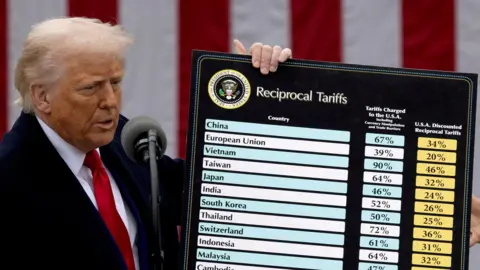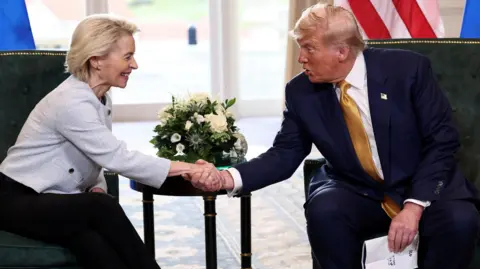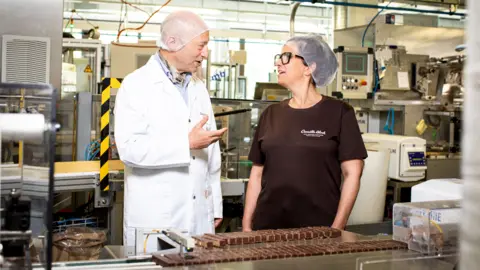Natalie ShermanBusiness reporter
 Reuters
ReutersPerhaps the biggest battle in Donald Trump's trade war is about to begin.
The Trump administration heads to the U.S. Supreme Court on Wednesday to confront small businesses and a group of states that argue that most of the tariffs it has imposed are illegal and should be overturned.
If the court agrees, it would upend Trump's trade strategy, including the sweeping global tariffs he first announced in April. The government will also likely have to recoup some of the billions of dollars collected through tariffs, which are taxes on imports.
The judges will make a final decision after possibly months of studying the arguments and discussing the merits of the case. They will take a vote eventually.
Trump framed the fight in epic terms, warning that defeat would tie his hands in trade negotiations and jeopardize national security.
On Sunday, the president said he would not attend the hearing in person because he did not want to create a distraction.
“I wanted to leave so badly… I just don't want to do anything that would take away from the importance of this decision,” he said. “It’s not about me, it’s about our country.”
Trump previously said that if he doesn't win the case, the US will be “weakened” and in “financial chaos” for years to come.
The stakes seem just as high for many businesses in the U.S. and abroad, which are paying the price by being hit by rapidly changing policies.
Trump's tariffs will cost Learning Resources, a US seller of toys made mostly overseas and one of the companies suing the government, $14 million (£10.66 million) this year. That's seven times what the company spent on tariffs in 2024, according to CEO Rick Woldenberg.
“They have caused incredible disruption to our business,” he said, noting that the company has had to reschedule production of hundreds of products since January.
However, few entrepreneurs expect to win in court.
“We're hoping it's illegal, but we're still trying to prepare for it,” said Bill Harris, co-founder of Georgia-based Cooperative Coffees.
His cooperative, which imports coffee from more than a dozen countries, has already paid about $1.3 million in duties since April.
Test of Trump's presidential power
In deciding this case, the Supreme Court will have to answer a broader question: How far does presidential power extend?
Legal analysts say it is difficult to predict the justices' response, but ruling on Trump's side will give him and future White House occupants greater coverage.
Specifically, the case involves tariffs that the Trump administration imposed under the International Emergency Economic Powers Act (IEEPA) of 1977, which the White House supported because of its speed and flexibility. By declaring a legal emergency, Trump can issue immediate orders and bypass longer, more established processes.
Trump first invoked the law in February to tax goods from China, Mexico and Canada, saying drug trafficking from those countries constituted an emergency.
He applied it again in April, imposing charges ranging from 10% to 50% on goods from in almost all countries of the world. This time, he said the US trade deficit, where the US imports more than it exports, poses an “extraordinary and unusual threat.”
These tariffs began to take effect in fits and starts this summer, while the US pushed countries to make “deals.”
Opponents say the law authorizes the president to regulate trade but never mentions the word “tariffs,” and they argue that only Congress can set taxes under the U.S. Constitution.
They also questioned whether the problems cited by the White House, especially the trade deficit, constitute emergencies.
Members of Congress from both parties have said the Constitution also gives them responsibility for setting tariffs, duties and taxes.
More than 200 Democrats in both chambers and one Republican, Sen. Lisa Murkowski, filed the case in the Supreme Court, where they also argued that the emergency law does not give the president the right to use tariffs as a tool to gain leverage in trade negotiations.
Meanwhile, the Senate took a symbolic bipartisan step last week by passing three resolutions rejecting Trump's tariffs, including one aimed at ending his declared national emergency. They are not expected to be approved by the House of Representatives.
Still, business groups said they hoped the rebuke would send a message to judges.
“An energy leak like I've never seen before”
Three lower courts ruled against the administration. After the Supreme Court hears arguments on Wednesday, it will have until June to make its decision, although most expect a decision by January.
Whatever decision it makes will affect about $90 billion in import taxes already paid, which Wells Fargo analysts say represents about half of the tariff revenue collected by the U.S. this year through September.
Trump officials have warned that the amount could rise to $1 trillion if the trial continues into June.
 Cafe Campesino
Cafe CampesinoIf the government is forced to issue refunds, Mr Harris said Cooperative Coffees would “absolutely” try to get its money back, but that would not make up for all the disruption.
His business had to take out an additional line of credit, raise prices and find ways to survive with lower profits.
“It's an energy drain like I've never seen,” said Mr. Harris, who is also chief financial officer of Cafe Campesino, one of the 23 roasters that own Cooperative Coffees. “It dominates every conversation and just sucks the life out of you.”
What could happen next?
The White House says if it loses, it will impose fees through other means, such as legislation allowing the president to set tariffs of up to 15% for 150 days.
Even then, businesses will get some relief because other remedies would require steps such as issuing legal notices, which require time and deliberation, says trade lawyer Ted Murphy of Sidley Austin.
“It's not just about the money,” he said. “The President announced the tariffs on Sunday, which will go into effect on Wednesday, without advance notice and without any real process.”
“I think that's the most important thing for business, whether or not it happens in our future,” he added.
There is no clear indication of what the court will decide.
In recent years, he has reversed major policies such as Biden-era student loan forgiveness as an overreach by the White House.
But the nine justices, six of whom were appointed by Republicans, including three by Trump, have shown deference to that president in other recent controversies and have historically given the White House leeway on national security matters.
“I do think the Supreme Court has arguments in a lot of different directions,” said Greta Peisch, a Wiley partner and former trade lawyer in the Biden administration.
Adam White, a senior fellow at the American Enterprise Institute, said he expects the court to strike down the tariffs but avoids questions such as what constitutes a national emergency.
 Reuters
ReutersThe case has already complicated the White House's trade agreements, such as the one struck in July with the European Union.
The European Parliament is currently considering ratifying the deal, which would set U.S. tariffs on European goods at 15% in exchange for promises including allowing more U.S. agricultural products to be imported.
“They are not going to act on this issue until they see the result of the Supreme Court decision,” said John Clarke, former director of international trade at the European Commission.
 Chocolates Camilla Bloch
Chocolates Camilla BlochIn Switzerland, which recently lowered its economic growth forecasts citing a 39 percent U.S. tariff on its goods, chocolate maker Daniel Bloch said he would welcome a ruling against the Trump administration.
His business, Chocolats Camille Bloch, covers about a third of the cost of new tariffs on kosher chocolate, which his firm has exported to the United States for decades as it seeks to curb rising prices and maintain sales. According to him, this decision has deprived the division of profits and is not sustainable.
He hopes Trump will reconsider his tariffs altogether because “that would be the easiest thing to do.”
“If the court were to overturn the tariffs, we would certainly view that as a positive sign,” he said. “But we don’t believe this will lead to a solution.”









